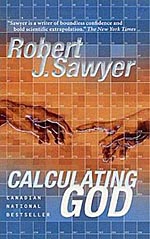
![]() attackofthebooks
attackofthebooks
4/29/2014
![]()
I lucked out when I found Calculating God. It was one of those I'm-bored-and-I-have-nothing-to-read-so-I'll-browse-the-shelves-and-randomly-pick-something finds.
I was in for a treat. Winner of the Nebula Award, Robert Sawyerpresents an interesting thought experiment: what if Earth were discovered by an alien race, or rather, TWO alien races, and they informed us that, contrary to popular scientific belief, the universe and everything in it indicates that there is a god, a creator, a being greater than the laws of biology, physics, and chemistry, that this being had created the universe for a purpose, and we are all a part of that purpose.
What if?
The story itself is simple, and, as one reviewer put it, Sawyer is one of the more sympathetic sci-fi writers to the intelligent design community. An alien ship lands in front of the Royal Onterio Museum in Toronto and asks, not to "take me to your leader," but to "take me to a paleontologist." The paleontologist, of course, is an atheist, but confronted with his alien counterpart and investigating the concurrent histories of their races, begins a series of discussions about the laws of the universe. Are they mere coincidences, or is the alien correct.
Is there a "creator" behind it all?
I found the Calculating God intriguing, full of thought provoking dialogue. It's not for the reader who is looking for escape in swashbuckle, laser swords, or space battles. Instead, it focuses on the science and the philosophy that might hold up a place for a rational mind behind the universe. In other words, God. What makes it work is Sawyer's deft application and understanding of science and his relevant application to the thought experiment. While I am not myself a scientist, science has always represented a look at "how things work" for me, and never ceases to impress with explanations of the natural world, and Sawyer plays right to that interest.
Calculating Godwastes not time on complicated plot twists or sequences, but manages to deal with important questions as diverse as the purpose of life, the problem of pain, death, and loss of loved ones, all against a backdrop of the scientific laws upon which the universe depends. C.S. Lewis might find it interesting, even if a little outside his genre.
Sawyer's main leaps, and creative license, is in a "fifth force" that he suggests is yet to be found by human scientists, but as far as I know we have not yet found, as well as the successful development of a grand unifying theory of everything. I believe this refers to a theory that will explain both gravity (forces of the very big) and quantum mechanics (forces of the very small). Our present understanding has neither, but both conveniently move his story along. This is Sawyer's contribution, as well as his deus ex machina to finding the real deus in the universe.
If you enjoy this, you might also enjoy Finding Darwin's God: A Scientist's Search for Common Ground Between God and Evolution (P.S.) by Kenneth R. Miller, as well asConsilience: The Unity of Knowledge and The Diversity of Life (Questions of Science) byEdward O. Wilson (though the three do not necessarily agree with each other and all are non-fiction).
http://www.attackofthebooks.com/review-calculating-god-by-robert-j-sawyer/